¡®Constructive Policy Debates for Parliamentary Audit¡¯
Four rivers restoration, Sejong City and other mega-projects provoke heated debates
A stream of policy criticisms and suggestions overflowed during a parliamentary interpellation of the government that ran from Oct. 5-24.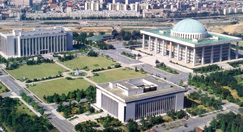
In particular, the four rivers restoration scheme and the Sejong City development project are among the mega-projects that have apparently provoked tremendous debate among the ruling Grand National Party and opposition party members.
The parliamentary committee¡¯s activities have produced constructive policy criticism and suggestions so far, but opposition party representatives have still resorted to dumping a heap of allegations and criticisms of such contestable issues as the four rivers restoration scheme and the construction of Sejong City, a new multifunctional administrative city, to be created in Yeongi, Chungcheongnam-do.
Political analysts say the annual parliamentary inspections should be done in the form of a sincere policy debate under bipartisan partnerships, not partisan ¡°opposition for opposition sake¡± strategies targeted only to further unconfirmed allegations.


Rep. Chang Kwang-keun, a GNP member of the National Assembly Land, Transport and Maritime Affairs Committee, said on Oct. 10 of the committee¡¯s inspection into the Multifunctional Administrative City Construction Agency responsible for the construction of Sejong City that no more criticism for the sole purpose of defaming should be allowed surrounding the four rivers restoration project and now is the time for all to debate in a constructive manner so that the projects can be carried out. Opposition party members have put up opposition to the project, denouncing it as the government¡¯s disguised tactics to build four grand canals as President Lee Myung-bak announced during his presidential campaign.


Rep. Chang said everyone knows that the four rivers restoration project is designed not only to turn around the sagging economy amid the global economic downturn, but also to address such issues as the prevention of floods, water shortage and the improvement of water quality. He said opposition party members¡¯ allegations, including a possible rise in tap water charges and the exacerbating of Korea Water Resources Corp¡¯s business conditions were groundless, not enough to prove the alleged uselessness of the project.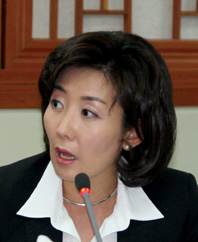

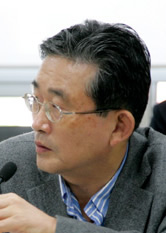
The Sejong City project has become a ¡°hotly contested issue¡± since Prime Minister-designate Chung Un-chan dropped a bombshell by indicating a possible change of the administrative city scheme into a self-sufficient one during his confirmation hearing. President Lee Myung-bak is to make his position on the issue clear soon, Cheong Wa Dae officials said. Lee was quoted as saying in a recent meeting with some Chungcheong officials that it should be approached with a win-win strategy, benefiting not only Chungcheong Province residences, but also the whole nation.
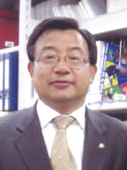
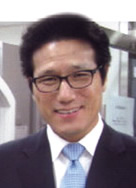
Rep. Kim Chung-kwon, hailing from Gimhae A electoral district of the Grand National Party, echoed Rep. Chang, saying that the four rivers restoration project should be completed at the earliest possible time in order to ensure the permanent prevention of floods and to secure a stable water supply. Kim added that steps to relocate affected residents and invigorate the regional economies should be complemented.
The following are the gist of policy suggestions lawmakers made during the parliamentary committees¡¯ audit of government agencies and public organizations.
Rep. Baek Seong-woon of the GNP (Ilsan, Gyeonggi-do) told a National Assembly Land, Transport and Maritime Affairs Committee session on Oct. 6 that the Great Train Express (GTX) project, a high-speed mass-transit network in the Seoul Metropolitan Region that the Gyeonggi Provincial Government envisages as a national task, should be done with the government¡¯s fiscal support since private investments are not sufficient. He also said priority should be given to the construction of the KINTEX-COEX line, one of the three proposed GTX lines.
Rep. Chung Hee-soo of the GNP (Yeongcheon, Gyeongsangbuk-do) told the session on the same day that 210,000 tons of wide flange beams found to have not been certified to Korean standard were imported from foreign countries during the period between April and August, undermining the domestic construction industry. He said the problem is that only 150 cases of the so-called H-Beam, accounting for a meager 7.1 percent of the 2,109 cases subject to the requirements, were submitted to quality inspection organizations for approval.
Rep. Yoo Jeong-bok of the GNP (Gimpo, Gyeonggi-do) claimed that the too-stringent regulation on the installation of an anti-freezing layer designed to prevent the weakening of the foundation at road construction sites is a waste of an astronomical amount of money.
Rep. Hur Chun of the GNP (Chuncheon, Gangwon-do) said the Seoul Metropolitan Government and the Gangwon-do Provincial Government should collaborate on a project to enhance the value of the origin of the Han River since the starting point of the river is located in Gangwon-do, even though Seoul is the largest beneficiary of the river.
Rep. Yoon Young of the GNP (Geoje) told the committee session that bottled water importers profiteer by selling deep-sea water products for 8,000 won each, a 13-fold jump over its import price tag of 580 won.
Rep. Lee Byung-suk, chairman of the National Assembly Land, Transport and Maritime Affairs Committee, made a proposal to the North Korean side to make a first-hand observation tour to South and North Korea in connection with the so-called Silk Railroad project to link South Korea, North Korea and Eurasia.
Rep. Kim Sung-tae of the GNP said roads are normally built in a lattice-type format under plans on the nationwide road network, but private investment road projects are carried out without paying for their privilege to collect higher toll charges in return for building short-cut expressways in disregard of existing ones.
Kim Ki-hyun of the GNP (Ulsan) told the National Assembly Knowledge Economy Committee session on Oct. 6 that extracting rare metals out of used home appliances and other industrial wastes should be dealt with in a forward-looking manner in Korea, citing statistics that Korea lags behind Japan in terms of research, technology development and industrial technology prowess.
Rep. Bae Eun-hee told the session that duplicated inspections on fuel cells should be unified.
Rep. Chung Tae-geun of the GNP said energy welfare policies on those in the low-income bracket should not have been made in light of the way energy is being wasted, citing the fact that heating with electricity is less efficient than through gas or other energy sources.
Rep. Lee Han-gu of the GNP (Daegu) said in the National Assembly Legislation and Judiciary Committee¡¯s audit of the Financial Supervisory Service that card issuers saw the issuance of credit cards surging 11.9 percent during the past three-year period until June 2009, and the imprudent issuance of credit cards during the economic downturn and the financial crisis led to illegal card discounts, a method of creating credit card sales in return for borrowing cash at a higher interest rate from money lenders, with unlawful card discount crackdown cases climbing 72 percent during the period between the second quarter of 2008 and the second quarter of 2009.
Rep. Jin Sung-ho of the GNP told the National Assembly Culture, Sports, Tourism, Broadcasting and Communications Committee session on Oct. 5 that local governments were found to waste budgets in connection with the imprudent construction of drama and movie locations, some with procedural woes, and they need to be built according to history, culture and tourism resources.
Lee Kyung-jae of the GNP (Incheon) said too-lenient punishment for violating telecommunications service providers¡¯ accounting regulations may lead to moral hazards, with the number of violation cases soaring to 340 in 2008, up from 36 in 2004, and a legal foundation should be laid to impose a surcharge equivalent to 3 percent of sales.
Rep. Na Kyung-won, told the session that concerning the controversial introduction of a media representative system, an option of introducing a media representative of each broadcaster, could be feared to do harm to consumers due to collusions between broadcasting networks and advertisers, citing allegations that cable program providers and advertisers might be involved in collusion in the event of unsafe food scare cases.
Rep. Chung Byung-guk said that figures released by the Ministry of Culture, Sports and Tourism showed that 921 regional festivals ¡ª roughly three every day ¡ª took place yearly, but the portion of foreigners participating in the festivals accounted for 1 percent in 2005 and 1.5 percent in 2007, and that the festivals should be connected with meeting, incentive, convention and exhibition industries under a win-win strategy. Concerning the topic ¡°What can be done to enhance the national brand power?¡± he said Korea ranked 33rd out of 50 countries in terms of a national brand index. The Korean government aims at 15th place by 2013, the average OECD level.
Rep. Lee Jung-hyon of the GNP said the so-called swine flu cancelled many regional festivals, costing 13.5 billion won, and foreign tourists who cancelled or delayed their trips to Korea numbered 54,354.
Rep. Yoon Suk-yong told the National Assembly Health, Welfare and Family Affairs Committee on Oct. 14 that a drive for donating hematopoietic stem cells should be proliferated with 447 leukemia patients having marrow transplanted and 3,073 others put on the waiting list.
Rep. Kim Kwang-lim of the GNP (Andong) grilled the Korea Investment Corp. over how to draw investment portfolio plans in the case of hyperinflation.
Rep. Jin Soo-hee of the GNP told the National Assembly Strategy and Finance Committee on Oct. 15 that the revision of the Bank of Korea Act on the independence of the central bank should be made in keeping with international collaboration following the upcoming G-20 summit talks. She said neutrality on Article 3 may be a little bit different from compatibility with government policies in Article 4, and the governor should keep a moderate, neutral line in a wise manner.
Rep. Yoo Il-ho of the GNP disputed with the Bank of Korea¡¯s lending in which the central bank borrowed money in the short term, but replaced the loans with long-term bonds. He made the dispute citing the purpose of legislation despite the central bank¡¯s explanation that the loans were made in accordance with the Bank of Korea Act and within the limit set by the National Assembly. nw
3Fl, 292-47, Shindang 6-dong, Chung-gu, Seoul, Korea 100-456
Tel : 82-2-2235-6114 / Fax : 82-2-2235-0799